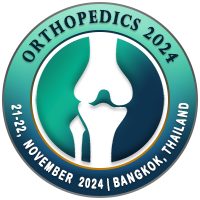
Jesheen Mann
D.Y Patil Hospital, IndiaTitle: Damage control resuscitation vs early total care- current trends
Abstract
In the past four decades, there has been significant evolution in the timing and fixation of extremity and pelvic injury in polytrauma patients.
The “stable” polytrauma patients with femoral fractures can be managed safely in the first 24 hours with intramedullary nailing. “Damage Control” in the form of temporary external fixators are indicated in “unstable” or “in extremis” polytrauma patients. What remains controversial is the management of “borderline” patients and the ideal timing for definitive fixation surgery.
Probably the good candidates for Damage Control are “Borderline” patients with closed head injuries, poor ventilator parameters and inadequate response to resuscitation in the form of failure of lactate levels to normalize.
Recent evidence advocates that the indiscriminate usage of Damage Control might be detrimental and lead to substantial increase in cost of healthcare. In this regard, the concept of “Early Appropriate Care” (EAC) has been proposed which primarily looks at normalized parameters associated with the acid-base system. This allows the patient to receive definitive surgical procedures in an approach that offers the benefits of Early Total Care (ETC) together with the apparent safety of Damage Control.
Biography
Dr. Jesheen Mann has completed her Bachelor of Medicine, Bachelor of Surgery (M.B.B.S) at the age of 23 years from D.Y Patil School of Medicine and Hospital, Mumbai, India. She has presented papers and posters at national conferences. She is an Emergency Medicine and Orthopaedics aspirant.

